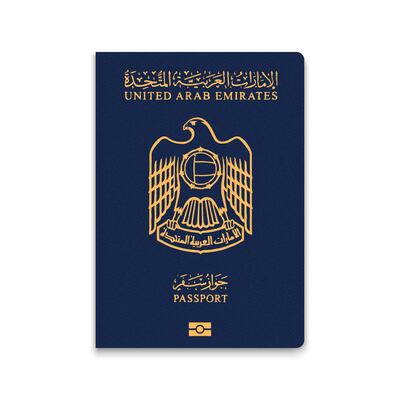The UAE is the only Arab country ranked on the list of the world's top 20 most powerful passports in the first quarter of 2022, according to the Henley Passport Index.
The Emirates moved up one place into 15th place on the global index, the highest spot the Arab world's second-largest economy has achieved since the index was launched in 2006.
UAE passport holders can now enter 175 destinations around the world visa-free, according to the index, which ranks the strength of 199 passports.
Japan and Singapore were crowned joint first on the Henley Passport Index, which assesses the travel documents based on how many countries citizens have access to without the need for a visa, using data from the International Air Transport Association.
Passport holders of the two Asian countries can now enter 192 destinations around the world visa-free – 166 more than Afghans, who rank last and only have access to 26 countries where they do not require a visa in advance, according to the research findings released on Tuesday.
“Passports and visas are among the most important instruments [affecting] social inequality worldwide as they determine opportunities for global mobility,” said Christian Kaelin, chairman of global investment migration company Henley & Partners.
Germany and South Korea held on to joint second spot, with their passport holders able to enter 190 destinations visa-free, while Finland, Italy, Luxembourg and Spain shared third place, with their citizens having visa-free access to 189 destinations.
US and UK passports regained some of their previous strength after falling to eighth place in 2020 – the lowest spot held by either country in the index’s 16-year history.
Both countries are now ranked sixth, with a visa-free/visa-on-arrival score of 186, according to the index.
Ukraine and Georgia also made significant progress, with both moving up 25 spots in the rankings over the past 10 years, making them the highest climbers in the Commonwealth of Independent States region.
chairman of Henley & Partners
In the Middle East, Qatar is ranked 53rd, followed closely by Kuwait in 54th place. Bahrain is ranked 62nd while Oman is 64th and Saudi Arabia is in 65th position.
The most recent data from the Henley Passport Index shows a worrying gap in global mobility, the biggest in the index’s history.
In 2006, a person could, on average, visit 57 countries without needing a visa in advance, according to Henley & Partners. Today, that number has grown to 107.
However, the overall increase masks a growing disparity between countries, with citizens from nations such as Sweden and the US able to visit more than 180 destinations visa-free while passport holders from Angola, Cameroon and Laos are only able to enter about 50 countries.
Wealthier countries’ gains in travel freedom have come at the expense of poorer countries, which have experienced mounting barriers to entry in recent years, according to research by Henley & Partners.
“The research reinforces the harsh realities of global mobility today: if you are fortunate enough to have a passport from a rich and stable country – regardless of form of government – you can move relatively easily across international borders,” said Erol Yayboke, director of the Project on Fragility and Mobility at the Centre for Strategic and International Studies in Washington.
“If not, the difficulties of poverty and conflict forcing you to leave home are just the beginning of a tough journey abroad.”

Meanwhile, the movement restrictions imposed to contain the spread of Covid-19 resulted in a wider global move to embrace other citizenships, the research found.
Ultra-high-net-worth individuals (UHNWI) are seeking alternative residencies and citizenship as a result of the pandemic, property consultancy Knight Frank said in a report last year.
Globally, about a quarter of UHNWIs planned to apply for a second passport or citizenship in 2020, the Knight Frank survey said.
“During the current economic crisis, countries with established residence-by-investment programmes have benefitted from the alternative revenue stream,” said Juerg Steffen, chief executive of Henley & Partners.
"Clearly, governments that adjust their policies to allow foreign investors to settle with ease will win the competitive race for both revenue and talent in 2022."
The UAE announced last year that non-Emiratis can obtain Emirati citizenship. Skilled professionals will be nominated by government or royal court officials.
People eligible for nomination include investors, people with specialist qualifications – such as doctors or scientists – as well as artists and other “talented” or “creative” people.
The strongest passports in the first quarter of 2022:
- Japan and Singapore
- Germany and South Korea
- Finland, Italy, Luxembourg and Spain
- Austria, Denmark, France, Netherlands and Sweden
- Ireland and Portugal
- Belgium, New Zealand, Norway, Switzerland, the UK and the US
- Australia, Canada, Czech Republic, Greece and Malta
- Hungary and Poland
- Lithuania and Slovakia
- Estonia, Latvia and Slovenia
The weakest passports in the first quarter of 2022:
- Afghanistan
- Iraq
- Syria
- Pakistan
- Yemen
- Somalia
- Nepal and Palestine
- North Korea
- Bangladesh, Kosovo and Libya
- Lebanon, Sri Lanka and Sudan






